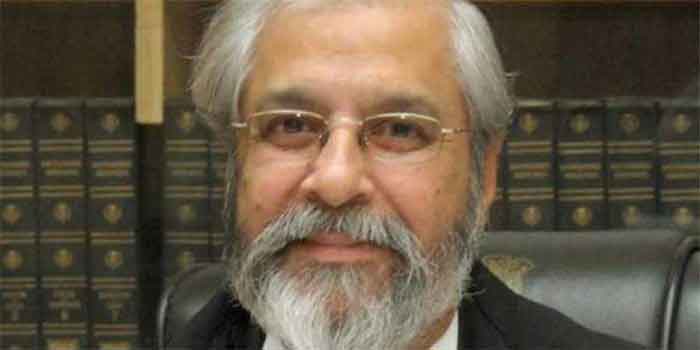
“Democratic values, like Humpty Dumpty, could have a great fall. And no one will be able to put them together again,” said Justice Madan Lokur, retired judge of the Supreme Court who currently serves on the Supreme Court of Fiji. Justice Lokur, who served in the SC from 2012-18, is the first Indian SC judge to serve another nation’s SC. He was the speaker at the seventh Sunil Memorial Lecture on November 29, 2020.
An annual lecture in memory of Sunil Gupta is conducted by his friends and former teachers of Jawaharlal Nehru University, New Delhi, on a Sunday in November. Each year for the past six years, the lecture has been held at JNU. Sunil Gupta was born on November 4. He died seven years ago aged 54, after serving for years in Madhya Pradesh, organizing tribal people and working for fisherfolk.
For the first time, this lecture was held online, and was attended by several people who did not personally know Sunil Gupta. Gupta, a student of Economics at JNU, finished his MA and moved to Itarsi in Madhya Pradesh, where he lived among tribal communities and worked in accordance with the teachings of Gandhi and Ram Manohar Lohiya.
Justice Lokur’s lecture on Sunday was titled “Judiciary and the Dynamics of Social Justice Litigation”. The retired SC judge said he would be speaking of three broad themes – social justice, dignity and personal liberty.
He said it would be up to future historians to analyze why social justice in recent years has taken the back foot in the Supreme Court. He reminded his audience that the Preamble to the Constitution reads: “We the people of India solemnly resolve… to secure to all its citizens justice, social economic and political…”
The onus of securing justice is thus on us, Justice Lokur reminded his audience, proceeding to illustrate how the laws that exist are not implemented as they ought to be. He spoke first of the case brought to the SC by Swaraj Abhiyan, pointing to how the National Rural Employment Guarantee Act was not being implemented as provided for in the law. Failure of the Centre to release funds on time meant that 100 days of work could not be guaranteed under the scheme; it also meant that those who had worked were deprived of wages. And several lakh people were thus deprived. Although the law provides for penalty if the payment is not made within 15 days, Justice Lokur remarked that he had never come across an instance where this penalty was paid.
Under the National Food Security Act, 2013, states were required to set up commissions to oversee the implementation of the law. However, this was not implemented as required, and among the worse impacted by this were children and construction and building workers; social justice was denied to the hungry, he said, adding that a cess is collected for such workers from all construction activity; although laws for the welfare of these workers are about 25 years old, these have not been implemented. The cess seems not channeled back into welfare for workers; a CAG audit revealed the cess was used for the purchase of computers and washing machines, without indicating how this benefited workers.
He recalled also the large number of homes for children under the Juvenile Justice Act that were operational without registration, and the frequency with which reports of sexual abuse of children lodged in such homes are reported in the press.
Justice Lokur recalled how hundreds of workers walked back several hundred kms to their rural homes after the lockdown was announced on March 24, with just four hours warning, to prevent the spread of the novel coronavirus. The Solicitor General, on March 31, told the Supreme Court that as of that day there was not one person on the roads, the retired justice said, in amazement.
Justice Lokur also underlined the need for laws to protect the dignity of widows in Vrindavan, Jagannathpuri and other temple cities, where many of these women earned their daily bread through chanting prayers at temples. Many of them were social outcastes and suffered psychological problems, but offered little legal protection.
The former SC judge also recalled the condition of brick kiln workers, who he said suffered grave injustice. In one recorded instance, a group of workers received an advance for working in a particular state, but were taken by the contractor to another state. They refused to work there and ran away; two of those who had attempted to run away were caught, and then offered a choice – they could opt to have either their hands or legs cut off. They suffered the loss of their hands. The criminals in this case were prosecuted, but the fact that such conditions of work should continue to exist in 21st century India is cause for reflection.
When it comes to social justice, the SC cannot plead helplessness, Justice Lokur said, alluding to the Mohinder Singh Gill judgment of 1977 which addressed “areas left unoccupied by legislation”. Justice Lokur explained that the court had told the election officials that they could exercise their power, without waiting for divine assistance just because there were no laws governing certain developments.
The NALSA judgment of 2014 and the decision in the Navtej Singh Johar matter in 2018 provided for the full citizenship of LGBT individuals, but the 2019 Transgender Persons Protections of Rights Act may be a step backward, and is being challenged in the SC, the retired judge said, adding that it is well known that one gay judge has been recommended for elevation to a high court, but his appointment has been pending for about two years.
On the matter of legislation in the “love jihad” matter, Justice Lokur commented on the remarks by some chief ministers, and warned that issuing veiled death threats while occupying such high office could set off communal lynching. He wondered why child marriage is not discussed more often, and what would happen to the freedom of choice when so many states plan legislation to prevent what is alleged to be “love jihad”, even though investigations by police forces have shown that there was no criminal design behind religious conversion on account of marriage.
Justice Lokur also dwelt on the “absence of grace” in recent Supreme Court judgments in matters of personal liberty. Without naming them, he mentioned how the 80-year-old Varavara Rao and 83-year-old Catholic priest Fr Stan Swamy were treated in jail, and how the court appeared to act with a complete lack of compassion, delaying even the request for a sipper so the elderly priest who suffered from Parkinson’s could drink water without worrying about his trembling hands. In Rao’s case, the NIA argued that he should ideally not be shifted to a private hospital, worrying about setting a wrong precedent. These rulings, the former judge said, were “bizarre, unacceptable and inhuman”.
Mentioning the accused in the February 2020 riots in North East Delhi, Justice Lokur wondered why they were not given hard copies of the 17,000 page chargesheet so they could prepare their defence, as provided for under the law. Instead, they were given pen drives, when it was not clear whether they would be able to use these, either in jail or outside. The government pleads that it does not have funds to provide hardcopies of the chargesheet, but when the matter is challenged in court, it finds the funds to pay lawyers to represent it.
Rosamma Thomas is an independent journalist
SIGN UP FOR COUNTERCURRENTS DAILY NEWSLETTER










































